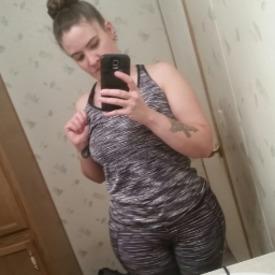40 days later - lost one pound

annebourne2
Posts: 14 Member
My calorie goal is 1480. I weigh 159 pounds and I'm 5' 8" tall. I've been tracking being as honest as I can and I'm not losing weight. I started spinning classes twice a week and will up that to three times a week now but I'm not losing weight. I think I lost an inch at my waist. Should I drop my calories to 1200? Not sure what to do, any advice would be great. I'm going to keep at it.
0
Replies
-
I'm 5'11" and my calorie goal is 1200 to lose. I lost 9 pounds in a month. I also exercise everyday. My goal is 135 I'm almost there. I think you may need to try 1200-1300 calories and see how that goes. Honestly ... it's not easy but wishing you luck. Weigh your food and measure also .. this will help0
-
Drink at least 64 ounces of water a day. I believe it really makes a difference with weight loss.0
-
I've been tracking for 40 days also and have lost 17lbs - I was 237 and am 5 6. I've been doing my 10,000 steps every day with the aid of a fitness band which has really motivated me and I've got back up to 5km running with an app on my phone. I have been sticking to 1200/1300 each day and not felt hungry and that is counting everything including vegetables and fruit (not like WeightWatchers!), I've also avoided alcohol. I think you need to definitely drop your calorie intake. I did this same thing three years ago and lost 2lbs every single week over a 14 week period. Keep going and don't lose heart.0
-
Thanks so much, everyone. I really appreciate your feed back. I will drink more water and I've changed my calories to 1200. Congrats to those of you that have lost weight and thanks so much for the feedback! I'll kept at it!!0
-
Are you weighing everything on a food scale? If not, you're overeating and under logging.0
-
If you are doing spinning classes and eating at your 1480 that is calculated for your weight and activity level, AND you lost an inch at your waist, then you are likely gaining muscle which weighs more than fat. The scale isn't your best indicator if your body isn't accustom to exercise. Focus on the inch lost at your waist. That is where you are likely losing fat and gaining muscle.
The scale is the worst thing you can focus on for a long term goal. Your health, the way your pants fit, when someone see's your face and can tell that you are healthier. Your ability to breeze through a spin class over time, you're no longer out of breath walking any kind of stairs or distances... These are the clues that tell you that you are doing something for yourself, not how the scale is moving.
If you follow the numbers, and keep up with what you are doing, you will see improvements and focus on the things that you do see, your increased strength and your pants fitting. Good luck.0 -
TechOutside wrote: »If you are doing spinning classes and eating at your 1480 that is calculated for your weight and activity level, AND you lost an inch at your waist, then you are likely gaining muscle which weighs more than fat. The scale isn't your best indicator if your body isn't accustom to exercise. Focus on the inch lost at your waist. That is where you are likely losing fat and gaining muscle.
The scale is the worst thing you can focus on for a long term goal. Your health, the way your pants fit, when someone see's your face and can tell that you are healthier. Your ability to breeze through a spin class over time, you're no longer out of breath walking any kind of stairs or distances... These are the clues that tell you that you are doing something for yourself, not how the scale is moving.
If you follow the numbers, and keep up with what you are doing, you will see improvements and focus on the things that you do see, your increased strength and your pants fitting. Good luck.
Agreed.
I'm consuming 2,400-2,600 calories per day and have only gained 2 pounds. But I've lost even more inches in my waist and gained half an inch in my biceps with a full inch in my forearms. I'm losing fat and gaining muscle.
My scale hasn't budge since the 2 pound gain, but my clothes keep getting baggy and my waist feels funny with it staying in by itself instead of sticking out.
0 -
Are you weighing everything on a food scale? If not, you're overeating and under logging.
This. You are not eating 1480 calories probably. Dropping to 1200 will only help because maybe now you'll only be eating 1600 instead of what you WERE eating which must have been close to maintenance.
Anything that is a liquid needs to get measured with measuring cup/spoon.
Anything solid needs to get weighed on a food scale.
Make sure you are choosing accurate entries in the database. Someone else's PB&J sandwich is not yours. You need to weigh the bread, weigh the PB, weigh the jam. No joke. It won't take as long as you think.0 -
First I want to say congratulations on losing an inch. That is fabulous. I agree with @blue4miles. I don't think you need to lower your goal to 1200 calories. I do think a food scale would be particularly helpful with calculating calories in your solid foods. I'm pretty good at eyeballing meat and fruits, but I can make 2 cups of rice fit a one cup measure, and I don't even want to talk about how bad I am at eyeballing cereal. Were it me, I would tighten up my food logging. After doing that for 3-4 weeks, if I didn't see any loss I'd probably lower my calories by 100 a day and see what happens.
Everyone is different. I weigh 200lbs and I'm 5'4". I'm losing about 1.5lbs a week on 1490 a day + eating back a portion of my calories earned through exercise.
0 -
You shouldn't need to lower your calories. I would make sure you're correctly counting and weighing your food.0
-
A tip I do for measuring is a teaspoon to measure my food. Many labels say 2 tablespoons, or 4 tablespoons. And 2 teaspoons is one tablespoons.
So if it says two tbsp. That's 4 tsp. And not heaping spoons either.
And to move on from this. One tbsp is about 1 ounce. So now you know, roughly, how many ounces you're eating.
If you get a heaping tbsp. Try for 2 ounces.
Then to get everything in the database, I just scan the Barcode then estimate via ounce or tbsp.0 -
Blackdawn_70631 wrote: »A tip I do for measuring is a teaspoon to measure my food. Many labels say 2 tablespoons, or 4 tablespoons. And 2 teaspoons is one tablespoons.
So if it says two tbsp. That's 4 tsp. And not heaping spoons either.
And to move on from this. One tbsp is about 1 ounce. So now you know, roughly, how many ounces you're eating.
If you get a heaping tbsp. Try for 2 ounces.
Then to get everything in the database, I just scan the Barcode then estimate via ounce or tbsp.
(Tbsp measurements vary by country, but...)
A Tbsp is actually 3 tsp.
And a fluid ounce is 2 Tbsp. But that is only valid if you're measuring calories based on volume and not weight.
Generally, if something gives you an ounce as a measurement, they're meaning WEIGHT, so you'd need to weigh it.
But even the estimated "2Tbsp" can be off, and not usually in your favor. I just had a dressing that was 180 calories per serving. A serving was "36 g, about 2Tbsp." But when I measure it, 2Tbsp filled evenly with the spoon, is actually 45 g. Which is substantially more calories. Spoons/cups are rarely a very good way to measure.
Edited to add: there is a difference between a fluid ounce and an ounce.
--Fluid ounce measures volume, or how much space something takes up. Most applicable to liquids.
--Ounce measures weight. Fluid ounces will be listed as fl. oz., and an ounce is written oz. An ounce is approximately 28.3g.0
This discussion has been closed.
Categories
- All Categories
- 1.4M Health, Wellness and Goals
- 398.2K Introduce Yourself
- 44.7K Getting Started
- 261K Health and Weight Loss
- 176.4K Food and Nutrition
- 47.7K Recipes
- 233K Fitness and Exercise
- 462 Sleep, Mindfulness and Overall Wellness
- 6.5K Goal: Maintaining Weight
- 8.7K Goal: Gaining Weight and Body Building
- 153.5K Motivation and Support
- 8.4K Challenges
- 1.4K Debate Club
- 96.5K Chit-Chat
- 2.6K Fun and Games
- 4.8K MyFitnessPal Information
- 12 News and Announcements
- 21 MyFitnessPal Academy
- 1.6K Feature Suggestions and Ideas
- 3.2K MyFitnessPal Tech Support Questions









